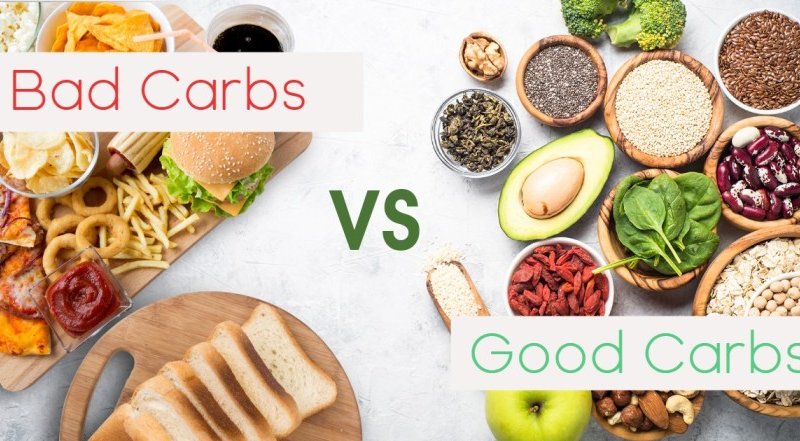There has always been a misconception about carbohydrates, especially when it comes to the terms good and bad carbs. Carbs or carbohydrates are a vital energy source and essential for overall good health. When one consumes carbohydrates, the body converts them into sugar/glycogen, which supplies the energy required for optimal body functioning. Carbs usually are the naturally occurring starches, fibers, and sugars in the food. They’re made of sugar molecules that are linked to form fiber and starch. Fiber doesn’t provide energy directly but helps maintain a healthy digestive system by feeding the gut’s friendly bacteria. It also helps prevent diabetes, heart disease, and prevent obesity by slowing digestion and keeping one full for longer. This article expounds more on the good and bad carbs.
Simple and Complex Carbs: Know the Difference
There are generally two types of carbohydrates: simple and complex carbs.
‘Good’ Carbs
Complex carbs include vegetables, beans, whole grains, and peas and are made up of long chains of sugar molecules that the body takes longer to break down before they’re absorbed. This implies that you will have consistent energy to keep you throughout the day. Food with complex carbs also has more fiber, minerals, and vitamins than simple carbohydrates, hence providing more energy. This is the main reason they’re referred to as ‘good’ carbs. In a nutshell, complex carbs are unprocessed and include fiber that occurs naturally in food. Some example of complex carbs are:
- Quinoa
- Vegetable
- Legumes
- Barley
- Whole grains
- Potatoes
- Corn
- Legumes
‘Bad’ Carbs
We refer simple carbs as bad carbs, but they are not necessarily all bad carbs. It all depends on the foods you’re getting them from. These are made up of smaller groups of glucose molecules, making them easier to absorb. These include processed carbs, juices, and refined sugars that are very low in minerals, fiber, and vitamins and get absorbed more quickly in the bloodstream leading to a rapid spike in blood sugar. The fruits also have simple carbs and contain fiber, minerals, and vitamins that support general health. It is also important to note that aside from fiber, fats and proteins also slow the absorption of glucose in the bloodstream. Therefore, combining simple carbs with healthy fat and protein is an excellent way of preventing spikes in blood sugar. This proves that there is no such thing as a ‘bad’ carb. Examples of simple carbs include:
- Sugar-sweetened beverages such as iced tea or lemonade
- Pastries
- Cookies
- soda
- candy
- White bread
- Energy drinks
- Ice cream
The Glycemic Load Factor
Differentiating carbs as either complex or simple is one way of classifying them. However, dieticians and nutritionists now use another concept in guiding people in making the best decision on the carbs they should eat. This is the glycemic index (GI) of food, which tells one how high and how quickly the blood sugar will go up after consuming the carbohydrate included in that food compared to consuming pure sugar. So, foods that are high in GI are easily digested, causing a fast rise in blood sugar, while lower GI foods digest more slowly. Therefore, knowing the GI for a particular food will help one understand how the carbohydrates in that specific food will affect blood sugar.
The glycemic load factor is obtained by multiplying the food’s glycemic index by the amount of carbohydrate the food contains per serving and dividing by 100. A high GL is 20 or greater, medium 11-19, and low ten or less.
Carbs and Obesity
Although limiting your carbs intake can cause weight loss, it doesn’t mean that eating them in and of itself leads to obesity or weight gain in the first place. This is a myth that has been debunked. Although refined carbs and added sugars are linked to increased risk of obesity, the same is not true for the whole-food and fiber-rich carb sources. Although obesity has increased to 42.4 of adults, some populations have remained in perfect health while eating a high-carb diet. For instance, the Kitavan Islanders and the Okinawan people, who eat a huge serving of their daily calorie intake from carbs, have some of the longest lifespans.
Making the right choice on carbs intake
When it comes to nutrition, there is no one-size-fits-all solution. Low carb is great for some individuals, while others function the best with plenty. The optimum carbohydrate intake depends on several factors, such as:
- Gender
- Age
- Physical activity
- Metabolic health
- Personal preference
- Food culture
For instance, if one has a medical condition such as type diabetes, metabolic syndrome, or overweight, they might be carbohydrate sensitive, and reducing carbs intake is the best decision. If one is highly physically active and has a naturally lean body type, they will function best with plenty of carbohydrates in the diet.


